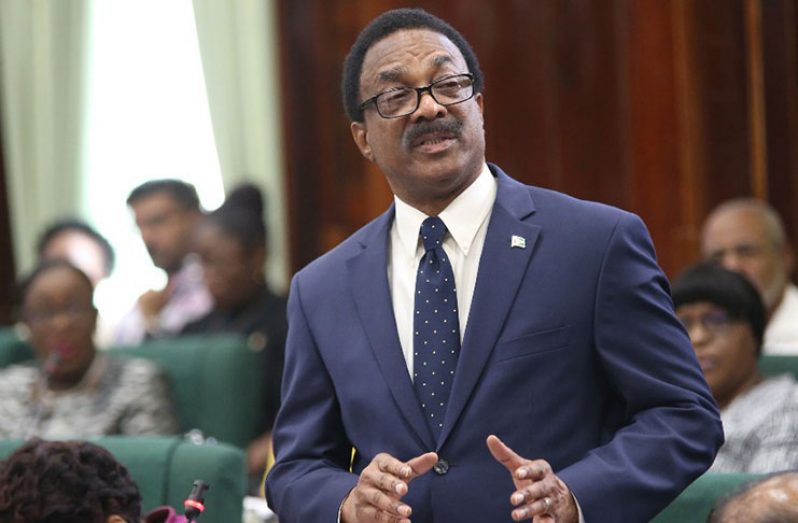…AG lays down 16 grounds in partial appeal
ARGUING that Chief Justice (ag) Roxane George-Wiltshire erred when she ruled that it would be unconstitutional to remove persons from the National Register of Registrants if they fail to register during this cycle of House-to-House Registration, Attorney-General and Minister of Legal Affairs, Basil Williams, laid out 16 grounds as he appealed, in part, the August 14 judgement on House-to-House Registration.
In a Notice of Appeal filed with the Court of Appeal, the Attorney-General, in the case brought against Chartered Accountant, Christopher Ram, the Chief Elections Officer and Commissioner of National Registration, Keith Lowenfield; and the Guyana Elections Commission (GECOM), said he was partially dissatisfied with the judgement of the High Court.
In setting out the grounds for the appeal, the Attorney-General told the appellate court that the learned Trial Judge erred and was misconceived in law when she ruled that Article 159 (5) of the Constitution which addressed ‘the qualifying date’ is only applicable to persons 14 years or older for the purpose of registration as at October 31, and not all Guyanese citizens. According to him, the Chief Justice (ag) failed to apply any cannons of interpretation in arriving at her decision, adding that the matter was already fully ventilated and argued before the Caribbean Court of Justice (CCJ), and as such, was, therefore, Res Judicata.
The acting Chief Justice, while validating the ongoing House-to-House Registration exercise embarked upon by the Elections Commission, ruled that it would be unlawful or unconstitutional to remove the names of persons who are already on the List of Registrants and who were not, or have not been, or are not registered in the current exercise with a consequence of non-inclusion in the list of electors. George-Wiltshire had explained that persons could only be removed from the list if they are deceased or disqualified pursuant to Article 159. In her judgement, Justice George-Wiltshire also ruled that residency, in the case of Guyanese, was not a requirement under the laws but the Attorney-General, in his application, contended that the Chief Justice again erred.
“The learned Trial Judge erred and was misconceived in law in finding that there is no law or laws in Guyana which set out additional requirements, more particularly, residence for purposes of Article 159 (2) ( c ) of the Constitution by failing to properly address her mind to sections 6 of the National Registration Act, Chapter 19:08 Laws of Guyana, The learned Trial Judge erred and was misconceived in law in failing to properly construe section 6 of the National Registration Act, Chapter 19:08 Laws of Guyana in order to find that residency is a requirement of the Act for purposes of Registration during the period of the ‘ qualifying date,’” the Attorney-General contended.
He, therefore, suggested to the appellate court that it would not be unconstitutional to remove persons from the list who had previously been on the list but was not registered during the House-to-House Registration period because of non-residency in Guyana.
Further to that, the Attorney-General alleged that the learned Trial Judge breached the separation of powers doctrine, contending that the Parliament clearly provided in section 6 of the National Registration Act, Chapter 19:08 Laws of Guyana for residency during House-to-House Registration. “The learned Trial Judge erred and was misconceived in law where, from the evidence, nothing established that there was a breach of the provisions of the Constitution, the National Registration Act or any other law but the evidence was consistent with the fact that GECOM acted in accordance with Article 159 (2) ( c ) 159 ( 5) and 162 of the Constitution of Guyana; the learned Trial Judge erred and was misconceived in law when she breached the separation of powers doctrine by purporting to issue instructions to GECOM, a Constitutional independent actor to not remove persons who are presently registered from the current National Register of Registrants (NRR) but who are not registered under new House-to-House Registration from the current National Register of Registrants (NRR),” the Attorney-General submitted to the Court.
On those bases, Minister Williams further submitted to the Court of Appeal that Chief Justice George-Wiltshire misdirected herself in law by failing to assess and address the importance and relevance of the provisions of the National Registration (Amendment) Act in the process of compiling a new National Register of Registrants. It is his belief that contrary to the ruling of the High Court, the provisions of the National Registration Act (NRA) and the Elections Laws (Amendment) Act ought not to be read together in the creation of a new National Register of Registrants. According to him, the Elections Laws Amendment Act applies to an existing Register and not the creation of a new National Register of Registrants under the National Registration Act Chapter 19:08.
“The learned Trial Judge erred and misdirected herself in law when it was not proper for her to rule on the issue of persons being removed from the list because it was not an order specifically claimed or sought by the Applicant; and the learned Trial Judge erred in law and/or misdirected herself on the evidence as a whole,” the Attorney-General said as he summed up his arguments in the notice of appeal. He is, therefore, asking the court to set aside or reverse the judgement of the Learned Trial Judge based on the grounds laid out.
Photo of Attorney-General and Minister of Legal Affairs Basil Williams





.jpg)








